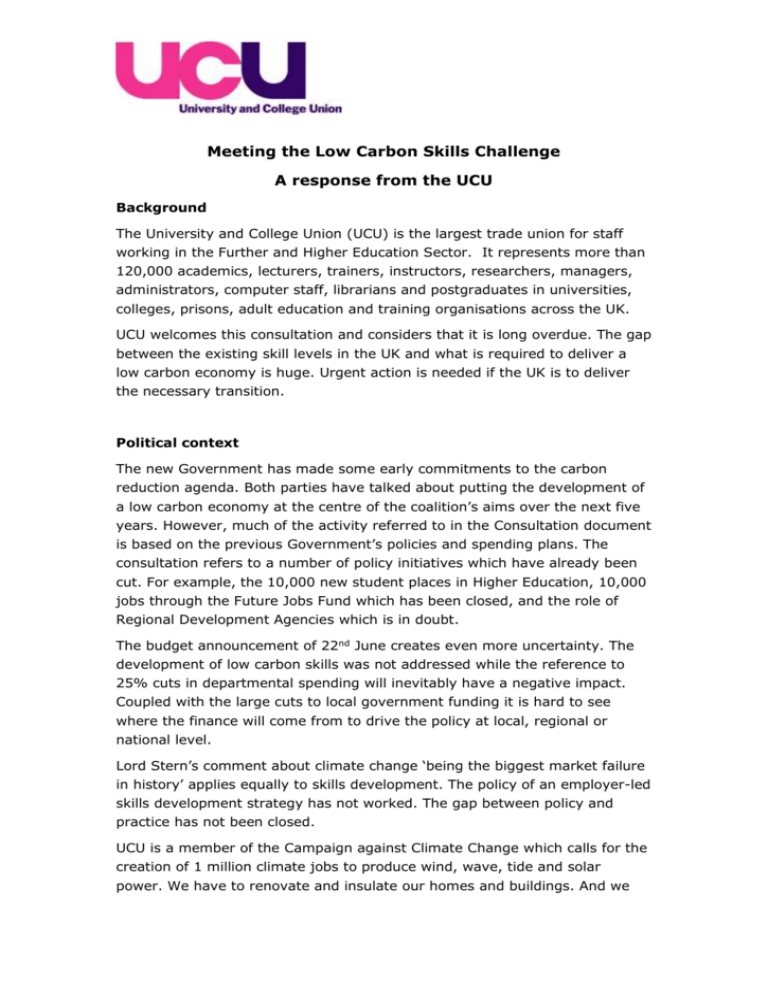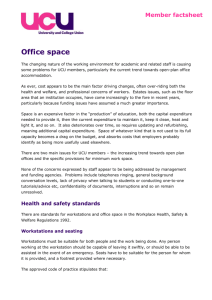“New work situations bring new risks and challenges for
advertisement

Meeting the Low Carbon Skills Challenge A response from the UCU Background The University and College Union (UCU) is the largest trade union for staff working in the Further and Higher Education Sector. It represents more than 120,000 academics, lecturers, trainers, instructors, researchers, managers, administrators, computer staff, librarians and postgraduates in universities, colleges, prisons, adult education and training organisations across the UK. UCU welcomes this consultation and considers that it is long overdue. The gap between the existing skill levels in the UK and what is required to deliver a low carbon economy is huge. Urgent action is needed if the UK is to deliver the necessary transition. Political context The new Government has made some early commitments to the carbon reduction agenda. Both parties have talked about putting the development of a low carbon economy at the centre of the coalition’s aims over the next five years. However, much of the activity referred to in the Consultation document is based on the previous Government’s policies and spending plans. The consultation refers to a number of policy initiatives which have already been cut. For example, the 10,000 new student places in Higher Education, 10,000 jobs through the Future Jobs Fund which has been closed, and the role of Regional Development Agencies which is in doubt. The budget announcement of 22nd June creates even more uncertainty. The development of low carbon skills was not addressed while the reference to 25% cuts in departmental spending will inevitably have a negative impact. Coupled with the large cuts to local government funding it is hard to see where the finance will come from to drive the policy at local, regional or national level. Lord Stern’s comment about climate change ‘being the biggest market failure in history’ applies equally to skills development. The policy of an employer-led skills development strategy has not worked. The gap between policy and practice has not been closed. UCU is a member of the Campaign against Climate Change which calls for the creation of 1 million climate jobs to produce wind, wave, tide and solar power. We have to renovate and insulate our homes and buildings. And we have to provide a network of cheap buses and trains. The problem is that currently we do not have the skills base to deliver this. Consultation Questions This is a response to Questions 1-6. 1. What more can employers, schools and Government do to promote the take up of STEM subjects by young people, and encourage them to consider careers in low carbon sectors? The promotion of STEM skills is important across all parts of the education system. Many young people complete their education at Further Education Colleges and this sector has a crucial role to play. Employers need to offer more high quality work experience to FE students and school children to increase their understanding of STEM careers The take-up of STEM subjects by adults is also important and the strategy document does not address this sufficiently. Union Learning Reps have a role to play here and they have been successful in supporting career progression. The prospect of increased redundancies opens up the need for re-training to support employability within and outside affected workplaces. The increase of unemployed adults is compounded by the fact that many of them are ill equipped for STEM related occupations. A lack of diversity is a major problem in STEM related careers. For example, only 2% of engineering apprentices are female (and only 4% are black or an ethnic minority). In the UK, a recent DIUS Committee report supported the Government's efforts to promote diversity in engineering – STEMNET, the Science and Engineering Ambassadors programme, WISE, the Computer Club for Girls, and the work of the Royal Academy of Engineering and the Engineering Development Trust. But there is a lack of evidence on the factors that affect the career choices of women and other under-represented groups. DIUS was asked to commission research to examine these factors; evidence should then be used as a platform from which to develop and target widening participation initiatives. 2. What more can universities, working with businesses, do to help stimulate demand for the high level STEM skills required in the low carbon economy? Demand and take up are inextricably linked. It is not just universities that have a role to play here. FE colleges need to be encouraged to work more with businesses to stimulate demand in the local economy. The FHE sector 2 will not be prepared to make the investment needed to expand STEM courses at a time of financial restraints. There needs to be a clear government led policy that will expand job opportunities to underpin any planned expansion. Unless there is a strong prospect of a qualification leading to enhanced career prospects it will be difficult to encourage both students and institutions to make the necessary investment. The positive references in the consultation document to HEFCE funding measures has a huge question mark over it as a result of the 25% departmental spending cut planned for the autumn. 3. How can more colleges and universities be encouraged to respond to the need for more specialist skills in emerging low carbon sectors? All FHE institutions need to audit their current offer against the skills required for a low carbon economy. There is not a single programme area that could not benefit from some adaptation to its curriculum. In many cases this will just be in relation to ‘soft’ skills on sustainable development. For others it will mean significant changes or the piloting of new courses. Staff engagement in this process is vital. UCU has responded to this challenge by setting up a national Education for Sustainable Development (ESD) Group designed to support this development. A number of resources including an ESD Guide for UCU Branches have been put up on the UCU website. In South Thames College this joint approach has led to a curriculum audit being conducted that will feed into a comprehensive review during the 2010-11 academic year. A joint management and union group has been set up to oversee this process. The lead-in time for curriculum, syllabus, qualifications and materials development means that there must be confidence that the process will have industry and government support. Each Examination board needs to carry out assessments of the relevance of their syllabus to specialist skills. There is an urgent need to reduce the development time for new qualifications while maintaining the necessary rigour in relation to quality. In Australia policies are being introduced to embed green skills in all qualifications within the national training system. The goal is to ensure all new trade apprentices will graduate with a core set of green skills and training knowledge Emerging industries may not have the required training capacity. Many will be micro / SMEs / where there will be a need for a strong interventionist role. The FHE sector needs to find a way to approach such enterprises. Sector Skills Councils should be active partners in this. Mutual exchange 3 programmes could encourage understanding where staff from both sides could spend short periods of time in each other’s organizations. Local alliances should be encouraged to drive the necessary changes. This fits the Governments bottom up / big society ambitions. In some local authorities these are already underway. There are useful examples that can be taken from models like the Apollo Alliance in the USA. These are coalitions of businesses, trade unions, local state organisations, and community groups. In the UK these could be forged at a local authority level. These ’Carbon Reduction Alliances’ could link the local authority to colleges, schools and universities with businesses, trade unions and organisations like Friends of the Earth, Greenpeace, and Transition Towns. 4. Is our overall analysis of the skills challenges, as outlined in this document, correct? The document focuses on the ‘hard’ skills challenge associated with low carbon jobs. There is not sufficient emphasis on the ‘soft’ skills needed across the economy. Attitude or behavioural skills training should be available to all employees. In those jobs that require continuing professional development it should be integrated. For others then a minimum requirement of ensuring it is covered during the induction process should be introduced. Green Jobs must be safe jobs. There is an assumption that a green job is by definition a good job. In fact many of them are to be found in industries with very poor standards of terms and conditions of employment. The waste/recycling sector has one of the highest fatality rates in the economy. The European Agency for Safety and Health reports: “New work situations bring new risks and challenges for workers and employers, which in turn demand political, administrative, technical and regulatory approaches to ensure high levels of safety and health at work”. New skills are needed to adapt to climate change. Many of these will have a health and safety element. It will be crucial that the ‘tension’ that can sometimes exist between environmental measures and health and safety is recognised and resolved. 5. What are the best ways to replicate the examples of good practice provided throughout this document quickly and effectively? In 2009 UCU contributed to a Green Alliance publication entitled ‘Working on change – the trade union movement and climate change’. Our section on training and skills identified a number of areas for action. 4 As Defra has recognised, the current business, demand-led approach to skills is “ill-equipped”1 to deliver the necessary skills, despite the clear bottom line benefits to companies. According to Martin Baxter, Chief Executive of the Institute of Environmental Management and Assessment, there has been a “general failure” in a large proportion of UK businesses to demand the low carbon and resource efficient skills they need, and to put ideas forward2. Government cannot delegate the need to be forward looking. Crossdepartmental and partnership working, rather than further re-structuring and privatisation, is needed to deliver on this agenda. Unions are keen to work with the 25 sector skills councils (SSCs) to do more on green skills, and to have an equal say on the development of sector skills agreements. These could develop our existing work on skills shortages particularly in science, technology, engineering and maths subjects. It is a concern that some SSCs have stated that there are no specifically green skills for their sectors. In fact, to deliver a low carbon future, every sector will require a wider range of skills, as well as culture change skills, and the softer skills that make people environmentally literate. It would be useful to have an audit of the existing skills and infrastructure that have the greatest potential to be transferred to low carbon employment. For example, the offshore oil industry has skills that will be invaluable to the development of offshore wind. Skilled construction workers could be quickly re-trained to fit energy efficient technologies and renewable energy. Lateral thinking is required, and the new skills required might be cross-sectoral so a centrally co-ordinated approach is essential. Combined heat and power systems require both gas and electrical skills. A plumber working to install solar water systems on roofs may need only fairly brief training on the technical mechanism itself but will also require training in working at heights. At the workplace level, both skills and the environment must be recognised as part of the negotiating agenda, with stronger rights for union environment representatives and union learning representatives. Representatives are already negotiating to support employees in obtaining green skills, stimulating demand for these skills and facilitating training in the workplace. The government can help employees obtain green skills and stimulate demand by ensuring better rights to time off for training. A Labour Research Department survey showed that only 7 per cent of respondents said their employer had given them the opportunity for re-skilling and up-skilling in relation to the environmental agenda3. The government can also drive demand from the top, particularly by strengthening markets for green products, so that if firms invest in skills they Skills for a Low Carbon and Resource Efficient Economy – A review of evidence, Pro-Enviro, 2008 Oral Evidence, HC 671-ii, House of Commons Environmental Audit Committee Enquiry into Green Jobs and Skills, 30/6/09 3 Labour Research Department, Unions and Climate Change, June 2009 1 2 5 know there will be a long-term market for them. Workers also need to feel secure that there is a market for skills they are considering acquiring or preserving. Otherwise, if laid off, they may chose to remain outside their sector even when things pick up, if they perceive it to be vulnerable to future recessions. This was the experience after the early 90’s recession, where many skilled workers in trades such as construction chose not to return to the industry, precipitating a real skills shortage. It is essential that people are allowed to re-skill whilst still in work. Once out of work their skills start to rapidly become out of date, particularly if they are forced to take a lower-skilled job to make ends meet. To address this, unions have called for increased levels of unemployment benefits and funding for short-time working, which could be combined with retraining and re-tooling. As the TUC’s Green Workplace project showed, union green representatives are already working with a number of employers on energy efficiency and sustainability through joint auditing and target setting. Many increasingly see energy efficiency as the new productivity, leading to both environmental benefits and financial benefits, such as lower production costs, and therefore greater job security or higher wages. Employers are beginning to recognise that UK employees are an untapped resource when it comes to tackling climate change – a Carbon Trust study found that 70 per cent of employees were keen to help their organisation cut carbon emissions, but wanted more help from their employer to do so4. Clearly, this area of training needs more funding. One cost-neutral way of achieving this could be through revenues from the auctioning of allowances under the EU emission trading system and the carbon reduction commitment (CRC) for larger service sector employers. The CRC measurements include recognition of the importance of employee involvement and training. 6. Is stimulating innovation in skills development and delivery the best way forward? UCU believes in an approach that includes skills needs but incorporates all aspects of sustainable development. A low carbon and resource efficient economy cannot be built on a narrow framework of skills but requires a holistic approach. The ‘free market’ is not capable of providing such an approach. A state interventionist strategy built on the principles of ‘just transition’ is the only way to deliver this economic and political objective. 4 http://www.carbontrust.co.uk/News/presscentre/2008/180308_Employee_research.htm 6











